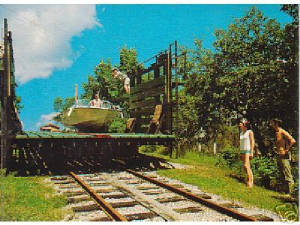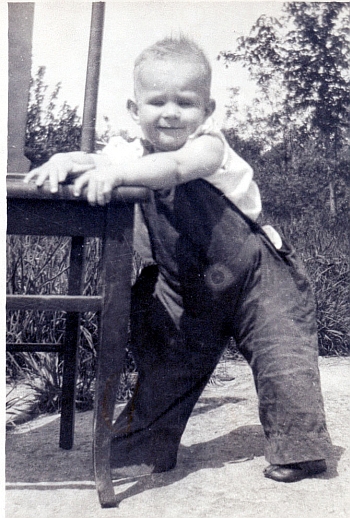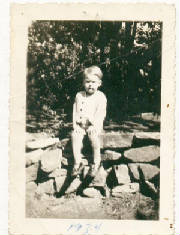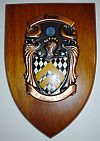| Big Chute Marine railway - 1930s |

|
1 to 10
Birth to 10 years of age
Scenario
My parents were married in June 1930
and I was born in August 1931. My mother had a difficult time during her pregnancy. My parents lived in a log house on the
family property located at the foot of Woods Bay on the Severn River near The Big Chute.
My Dad was working at helping my Grandfather (Frank Stanton Wood) with building and carpentry work on the Severn River
for cottagers. As well he was working part time on the Canadian Pacific Railway doing track maintenance. As of the month of
September 1931 my father was out of work until the following May. Prior to my
birth, my mother moved into Orillia (Brant St.) to stay with relatives until I was born, due to the difficulties of the pregnancy
and the need for her to remain quiet and close to medical assistance.
| Eddie, as I was known, at 8 mos |

|
The Beginning (8 am, Sunday, August 23, 1931)
After my birth at the Soldiers Memorial
Hospital, my mother and I stayed in Orillia for a time before returning to Woods Bay.
We literally lived in the bush with
few neighbours and some cottagers in the summer. Remember no phones, no radio, and no communications. When winter arrived
the Severn River became unusable. The only way to get from the house to Severn Falls was to trek over a path to the railway
track and then walk along the track to Severn Falls to get supplies. To do so, it was necessary to walk over a railway trestle
that spanned the Severn River. I was often carried over the bridge by my parents and was in awe of the view from that height.
Occasionally when a train came through unexpectedly we would have to climb to the edge of the trestle, while standing on a
steel beam suspended over the river and hold on as the train thundered through. Sometimes we were able to outrace the train
to the other side. My parents tried to ensure that no trains were scheduled and before we crossed over, they would hold their
ears to the steel rail to try and hear the trains vibration. This was difficult in the winter due to the possibility of freezing
ones ear to the track. Thus, it was necessary to use a cloth between the ear and the rail.
Our supplies would arrive at the Severn
Falls railway station around noon hour, being sent from the stores in Coldwater, usually on a Friday. My uncle Bill (Wood),
who worked on the railway track at Severn Falls, and my aunt Beth, who operated a small local store from their house, would
receive some food on the train as well, to tide us over for the following week. She would get in meat quarters and do the
butchering on her kitchen table, as we needed it. She had an icehouse, which served to keep the meat and other perishables.
In the spring of 1933 we moved into
Severn Falls and rented a small cottage (East Lynne) near a tiny beach (about 75 feet long). The cottage contained a kitchen
with a wood stove, a small living room and two small bedrooms. I remember that going from the living room to the bedrooms
you had one step up. My room was only slightly wider than my single cot. I recall that my uncle Frank (Wood) was working for
a time on the track with my dad and he stayed with us for a short time, sleeping on a cot in the living room. Every morning
before he and my dad would go to work, uncle Frank would sit beside my high chair and we would sing Red Sails in the Sunset.
I never forgot it.
| Eddie - 3 years |

|

Red sails in
the sunset
Way out of the sea
Oh carry my love one
Home safely to me
She sailed at
the dawning
Oh way out and blue
Red sails in the sunset
I'm counting on you

Red sails in
the sunset
Way out of the sea
Oh carry my love one
Home safely to me
Sweet wind we
must borrow
Make straight for the shore
We'll marry tomorrow
And you'll go sailing no more
Red sails in
the sunset
Way out of the sea
Oh carry my love one
Home safely to me
My father had by this time obtained full employment on the track maintenance gang
under my uncle Bill (Wood), who was the Track Foreman. As a result of this and the fact that we were located in a small cottage
at Severn Falls, my father set about to build us a home. My parents purchased a piece of property located on the main dirt
road entering the community (1932).
The population was about 35 at that time and contained a post office, a train
station and my Aunt Beth’s (Wood) home store. In the summer time, to cater to the cottagers, a larger store was open
(Dean’s) at the general dock which provided, general food items, boat rental (row boats & canoes), ice (cottages
has no electricity so an ice box was used) and other sundry products and services. The Smith family also had at their home
location a small store, post office, dock, water taxi, fuel & other services.
The Sweet family (Mel & his sons) had a water taxi service to take cottagers
to and from their cottages, since most had their boats stored at the cottage.
(House/Layout etc.)
My cousin Elmer Ferguson (of Bala) came to Severn Falls (aka The Severn)
and helped Dad with the building of the roof. I was able to climb the ladder to watch, much to dad’s chagrin. At age four we moved into
our new home, which had two bedrooms, a large kitchen and a living room. It was located on the side of hill with no basement.
But the space underneath served as a cold storage for our vegetables. We had a butter box (about 14" cubed) which was placed
under the outside of a slide up window and this served as another cold storage area. We did have an icebox that kept our daily
perishable food supply.
One of my memories is when they bought a live chicken from aunt Bess (which was
the practice then), My dad cut its head off with an ax and the body ran around for about five minutes as blood gushed from
its neck. The beak kept opening and shutting for some time. Not a great sight for a 2 year old. Mom would then pluck off the
feathers, cut off the feet, gut it and put it into a pot for boiling or into a pan for baking in the oven.
Even before the house was built, the first thing to do was to build an outhouse.
So dad dug a trench and covered it with a two-holer… an adult size and a smaller one for me. Toilet paper was considered
a luxury, so we used both Eaton’s & Simpson’s catalogues which was mounted on the wall with a nail. Most of
the catalogues were of newspaper type paper and a few were the glossy kind (which wasn’t very good to use).
After we moved in and got basic furniture, like beds and a stove (wood) that had
a water tank at one end, so that we could have hot water, thus the stove was kept going most of the time. Wood was readily
available, since we were in the bush. The men of the area would go out into the bush in the winter time and set up a location
to cull the trees which would then have their branches cut off and the logs cut into manageable lengths. Then using two horses
(from Mel Sweet) would drag the logs on a sled to each family’s home. Then the men would cut up the logs into 12-16”
lengths for splitting into stove size pieces, with the use of a gas powered saw (from Mel Sweet).
Also during the winter the men would gather in the bay near the town dock and
cut the ice into blocks which would be loaded onto a sled and again using the horses would drag the load next to an ice house
nearby. The ice would be pile high and covered with the sawdust from the tree cutting, to reduce the melting time of the ice.
This would keep it for most of the summer, not only for the local families, but for selling to the cottagers.
Keep in mind , there is no electricity. The well was across the road at the bottom
of our hill. It was down about 10' and to fill the pail, you tied a rope to the handle, turn the pail upside down and threw
in down the well hole. The pail would turn over and fill, then just pull it up. On wash day, Saturday, Dad and I would carry
up enough water to fill two galvanized wash tubs. They would be placed on the stove to heat, then mom would do the washing,
wring by hand and hand out to dry. Keep in mind, my mom had only one good working arm.
At aged five (1936) a school room was set up (next to what is now the church),
on property owned by the Deans and included all grades (1 to8) and one teacher Earl Haig, who later joined the airforce and
was killed. a couple of years later my dad and uncle Charlie (mom's brother) built a new one room school about 500 yards from
our house on the side of the main road (it still stands as a cottage - 2012).
It contained one room, complete with a blackboard along the front wall, a wash
basin, pail of water and a two holer outhouse. It also had a pot bellied stove for heating in the winter. Since our house
was the closest to the school, my dad would go to the school in the morning and start the fire before going to work. When
I was 9 years old, I was the one who went to the school after getting out of bed, to light the fire, return home for breakfast
and then back to a warm school room. One morning after I had piled wood in my arms to take into the school, a Dalmatian came
out of the bush and grabbed my right arm and pulled me to the ground. I could feel his teeth on my upper muscle, even through
my parka. With my left arm (I am a lefty) I hit him with one the sticks and he ran away. I had teeth marks for a few days,
but they had not broken the skin. I suspect that the dog was just playing. Of course, dad went back to lighting the fire.
In 1940, my dad joined the Army. He completed his basic and advanced training
at Camp Borden and was then assigned to the Provost Corp (now Military Police). He was not assigned overseas, due a growth
on his back, (which only bothered the military). He was very disappointed since he was born in Westham and wanted to see his
siblings. However he made the best of it. After starting out in the military facility at the CNE grounds for 2 years, he began
escorting prisoners of war from the ship that landed either in St. John, Halifax or New York and by train to either Gravenhurst
or Medicine Hat. After that he was made Sargeant and post to North Bay to search northern Ontario for deserters. He captured
several. One memory he had was that on the train to Medicine Hat, one of the prisoners escape through the toilet window from
the moving train. It was later determined that the prisoner has crossed the border into the USA.
|

